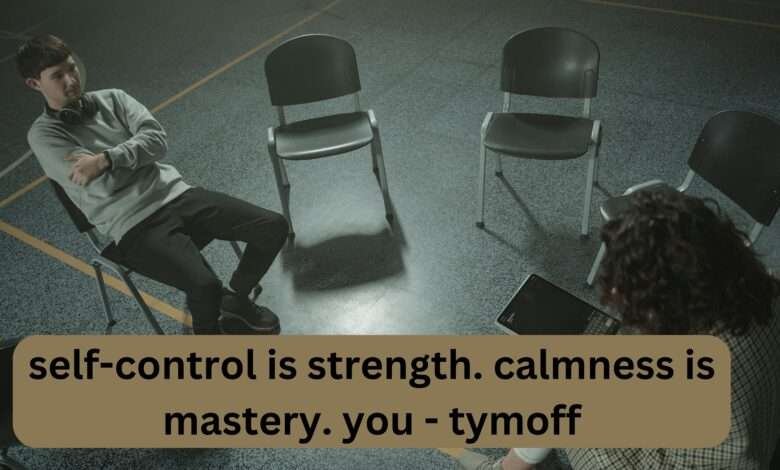Self-control is strength. calmness is mastery. you – tymoff

In today’s fast-paced world, maintaining a sense of calm amidst chaos is more crucial than ever. The mantra “self-control is strength. calmness is mastery. you – tymoff” serves as a powerful reminder of the importance of self-regulation and tranquility. In this article, brought to you by Baddiehub, we will delve into how self-control and calmness contribute to personal mastery and how the philosophy of “you – tymoff” can be a guiding principle in achieving these qualities.
Understanding Self-Control and Calmness
The Essence of Self-Control
Self-control is the ability to regulate one’s emotions, thoughts, and behaviors in the face of temptations and impulses. It is often seen as a cornerstone of personal strength and success. Mastering self-control enables individuals to stay focused on their goals, resist immediate gratification, and make decisions that align with their long-term objectives.
Calmness :
Calmness is not merely the absence of stress but a state of mental clarity and emotional stability. It is an essential component of effective decision-making and problem-solving. Achieving calmness involves managing stress and remaining composed even in challenging situations. It reflects a deep level of personal mastery and resilience.
The Philosophy of “Self-control is strength. calmness is mastery. you – tymoff”
Embracing the Concept
The phrase “self-control is strength. calmness is mastery. you – tymoff” encapsulates a philosophy that emphasizes the importance of self-regulation and tranquility in personal development. “Self-control is strength. calmness is mastery. you – tymoff” suggests a personalized approach to mastering self-control and calmness, tailoring these principles to fit one’s unique lifestyle and challenges.
Applying “Self-control is strength. calmness is mastery. you – tymoffYou – Tymoff” in Daily Life
- Setting Personal Boundaries: Establishing clear boundaries helps in maintaining self-control. Knowing your limits and sticking to them ensures that you remain focused and avoid unnecessary stress.
- Mindfulness Practices: Engaging in mindfulness practices such as meditation and deep breathing exercises can enhance your ability to stay calm and composed. These practices promote self-awareness and emotional balance.
- Goal Setting and Prioritization: Effective goal setting and prioritization are essential for maintaining self-control. By setting clear, achievable goals and prioritizing tasks, you can manage your time and resources more efficiently, leading to reduced stress and increased calmness.
The Benefits of Self-Control and Calmness
Enhanced Decision-Making
When you exercise self-control and maintain calmness, your decision-making abilities improve significantly. You are less likely to make impulsive decisions and more likely to approach problems with a clear, rational mindset.
Improved Relationships
Self-control and calmness contribute to healthier relationships. By managing your emotions and responding thoughtfully to others, you foster positive interactions and build stronger, more supportive connections.
Increased Productivity
A calm and controlled mindset leads to increased productivity. When you can manage stress and focus on your tasks without being overwhelmed, you can accomplish more and achieve your goals more efficiently.
Practical Tips for Developing Self-Control and Calmness
1. Practice Regular Self-Reflection
Self-reflection helps you understand your triggers and responses, allowing you to develop better self-control. Regularly assess your emotional and behavioral patterns to identify areas for improvement.
2. Develop Healthy Habits
Adopting healthy habits such as regular exercise, balanced nutrition, and adequate sleep supports both self-control and calmness. Physical well-being has a direct impact on mental clarity and emotional stability.
3. Seek Professional Guidance
If you find it challenging to manage stress and maintain self-control, consider seeking guidance from a mental health professional. Therapy and counseling can provide valuable tools and strategies for personal growth.
4. Engage in Relaxation Techniques
Incorporate relaxation techniques such as yoga, progressive muscle relaxation, and visualization exercises into your routine. These practices can help you manage stress and maintain a state of calmness.
5. Build a Support System
Surround yourself with supportive individuals who encourage your growth and provide constructive feedback. A strong support system can help you stay motivated and focused on your goals.
The Role of “Self-control is strength. calmness is mastery. you – tymoff,” in Personal Growth
Personalization and Empowerment
“Self-control is strength. calmness is mastery. you – tymoff” emphasizes the importance of personalizing self-control and calmness strategies to fit your individual needs and circumstances. By taking ownership of your personal development journey, you empower yourself to achieve mastery over your emotions and behaviors.
Commitment to Growth
Adopting the philosophy of “self-control is strength. calmness is mastery. you – tymoff” involves a commitment to ongoing personal growth. Embrace challenges as opportunities for learning and remain dedicated to enhancing your self-regulation and emotional stability.
Conclusion
The philosophy of “self-control is strength. calmness is mastery. you – tymoff” offers valuable insights into achieving personal mastery through self-regulation and tranquility. By understanding and applying these principles, you can enhance your decision-making abilities, improve relationships, and increase productivity. Embrace the personalized approach of “you – tymoff” and commit to continuous growth and self-improvement.
As you navigate the complexities of life, remember that mastering self-control and calmness is a journey. With dedication and the right strategies, you can achieve a state of personal mastery that enhances both your well-being and your overall success.
FAQs
1. How can Self-control is strength. calmness is mastery. you – tymoff, improve decision-making?
Self-control helps you resist impulsive reactions and approach decisions with a clear, rational mindset. This leads to more thoughtful and effective choices.
2. What are some practical ways to develop calmness?
Practicing mindfulness, engaging in relaxation techniques, and maintaining a healthy lifestyle are effective ways to develop and maintain calmness.
3. How does Self-control is strength. calmness is mastery. you – tymoff, affect relationships?
Self-control allows you to manage your emotions and respond to others more thoughtfully, which contributes to healthier and more supportive relationships.
4. What role does “you – tymoff” play in personal growth?
“You – tymoff” emphasizes a personalized approach to mastering self-control and calmness, encouraging individuals to tailor strategies to their unique needs and circumstances.
5. Why is self-reflection important for developing self-control?
Self-reflection helps you understand your emotional triggers and behavioral patterns, enabling you to develop better self-control and make more informed decisions.
Disclaimer
This article is provided by Baddiehub for informational purposes only. The principles discussed, including “self-control is strength. calmness is mastery. you – tymoff,” are intended to offer guidance on personal development. Always consult with a qualified professional for personalized advice and support. Baddiehub does not endorse any specific methods or philosophies but encourages readers to explore various approaches to personal growth and well-being.
Also read : A true relationship is two imperfect people refusi – tymoff : Review by BaddieHub




